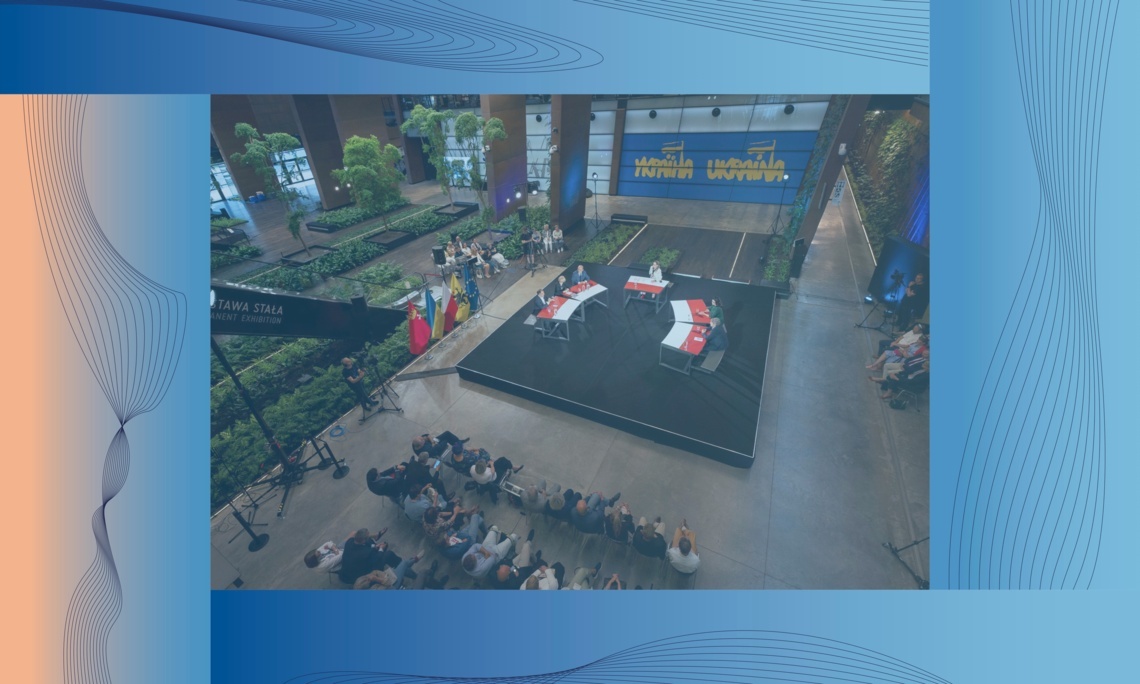- LIST
Invitation

We will meet in a symbolic place – the historic grounds of the Gdańsk Shipyard, where 45 years ago the independent civic movement “Solidarity” was born. The fate of Gdańsk reflects both the dark and bright chapters of world history. World War II began in Gdańsk, leaving the city in ruins. In the 1980s, it was also in Gdańsk where Solidarity initiated a peaceful revolution for human rights, leading to the fall of the Iron Curtain. The bloody consequences of totalitarianism can be read clearly in the history of Gdańsk. This past obliges us – Polish Europeans – to think responsibly about the future of our continent and to act with courage.
On June 3–4, 2025, during the Polish Presidency of the Council of the European Union, we invite you to Gdańsk. June 4 is one of those symbolic dates that hold special significance for our fate. On that day in 1989, two world-changing processes began. In Poland, the partially free elections resulted in a victory for Solidarity, and the communists ultimately lost their legitimacy. It was a political earthquake for the Soviet bloc. A wave of democratization began, leading to the fall of the Iron Curtain and the collapse of the Soviet Union. Meanwhile, in China on June 4, 1989, the Communist Party brutally crushed a peaceful protest movement. The communists not only strengthened their authoritarian political system but expanded its foundation by incorporating capitalism. A new global empire was born: political, economic, and technological.
The civic revolutions of 1989–1991 did not bring democracy and peace to all of Europe. The imperial tradition of Russia proved to be enduring. Alongside authoritarian allies, including China, Moscow seeks to undermine democracy. Using its resources and military power, it defends autocratic regimes worldwide and imposes its own principles on international politics. Unfortunately, even countries with long democratic traditions are falling under the dangerous allure of undivided, autocratic power.
The year 1989 also marked the start of the communication revolution of the "World Wide Web." This technological transformation changed every aspect of our lives. The digital revolution has a Janus face – it can strengthen democracy through participation, yet has also become a tool for its enemies.
We, Europeans, must once again decide in which direction our civic civilization will go. Will we barricade ourselves against global challenges in nationalist egoism? Or will we choose to defend the practice of solidarity among nations and the observance of human rights?
In recent years, democracies have lost their appeal and authority for many citizens. Dictatorships, on the other hand, have demonstrated how brutally they can defend their existence – by murdering and waging wars. They are also capable of effectively building international alliances. The authoritarian world uses new technologies and communication tools to weaken democratic solidarity and expand its influence. War is once again becoming a means of achieving political goals, as seen in Ukraine and the Middle East.
In democracies, the promises of social justice and human rights protection are no longer consistently fulfilled. At the same time, globalization, climate change, and wars have intensified the pressure for change in every area of public life. This has created a political atmosphere of fear – fear of revolutionary change, fear of losing what is familiar. This fear fuels anxiety about "the other." The idea of universal human rights is now on the defensive, as evidenced by the migration policies of many democratic countries.
We want to use the time of Poland’s EU Presidency to launch a civic discussion among advocates of free speech, people of culture and science, to talk about the state of Europe. Are we still faithful to the fundamental democratic ideal of solidarity based on human rights? What choices must we make for our values to remain credible and truly practiced?
We invite you to a dialogue at the European Solidarity Centre in Gdańsk – a cultural institution that remains faithful to the idea of universal solidarity – a solidarity not limited by religious community, culture, skin color, gender, or nationality.
"There is no freedom without solidarity!" – the slogan of Poland’s 1980 Solidarity revolution is still relevant today. This slogan empowers us as citizens.
Basil Kerski and the team of the European Solidarity Centre
Robert Piaskowski and the team of the National Centre for Culture Poland



